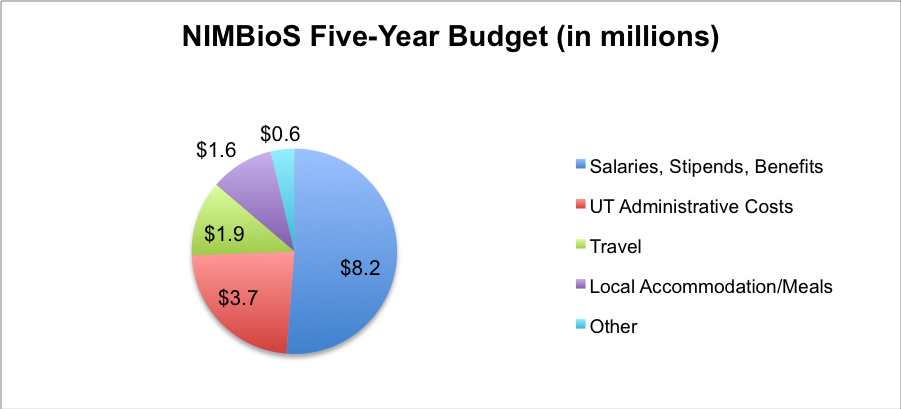NIMBioS Celebrates First Year with More Than 400 Participating Scientists, Scholars
The National Institute for Mathematical and Biological Synthesis (NIMBioS) celebrates its one-year anniversary in September, and thus far, more than 400 individuals from 15 countries and 43 states have participated in various research and educational activities.
Located on the campus of the University of Tennessee, Knoxville, NIMBioS focuses on advancing research and education at the interface of biology and mathematics. Programs for visitors to NIMBioS facilities began in March 2009, including working groups, investigative workshops, tutorials, and educational opportunities.
The National Science Foundation awarded $16 million over five years to establish the institute. NIMBioS' five-year budget includes $8.2 million for salaries, stipends, and benefits as well as $1.6 million for local accommodations and meals for visiting scholars. The NSF grant may be extended for an additional five years following NSF review of its activities in 2013.
NIMBioS has created 25 new jobs in Knoxville, of which 17 positions are filled as of September. Twenty-one jobs are full-time including benefits. NIMBioS will employ 50 postdoctoral fellows over the next five years and provide summer stipends for 60 students (undergraduates and graduates) and high school teachers to attend NIMBioS programs.
Job creation at UT and expenditures associated with NIMBioS will help support as many as 50 private sector jobs in the local community, along with additional private income in excess of $1 million per year, according to Professor Matthew Murray of the UT Center for Business and Economic Research.
Primary goals of NIMBioS are to address key biological questions using cross-disciplinary approaches in mathematical biology and to foster the development of a cadre of researchers who are capable of conceiving and engaging in creative and collaborative connections across disciplines.
NIMBioS encourages multidisciplinary participation in all its activities. Thus, participants have come from many scientific fields, including ecology and evolutionary biology, epidemiology, genetics, statistics, bioinformatics, and computational science, among others. Participants have also included researchers and wildlife managers from state and federal agencies and non-profit organizations. Students in grades 4-12, undergraduates, graduate students, and middle and high school teachers have participated in educational and research programs at NIMBioS.
"We are pleased that NIMBioS has already had an impact and look forward to providing more opportunities for scientists, educators, and students interested in pursuing research or developing a greater understanding of the applications of modern math and computational science in biology," said Louis Gross, NIMBioS director and UT professor of ecology and evolutionary biology.

For more information about NIMBioS research opportunities and educational programs, visit www.nimbios.org
The National Institute for Mathematical and Biological Synthesis (NIMBioS) brings together researchers from around the world to collaborate across disciplinary boundaries to investigate solutions to basic and applied problems in the life sciences. NIMBioS is supported by the National Science Foundation, the U.S. Department of Homeland Security, and the U.S. Department of Agriculture with additional support from The University of Tennessee, Knoxville.
For more information, contact Catherine Crawley at 865-974-9350 or ccrawley_at_nimbios.org
NIMBioS
1122 Volunteer Blvd., Suite 106
University of Tennessee
Knoxville,
TN 37996-3410
PH: (865) 974-9334
FAX: (865) 974-9461
Contact NIMBioS


